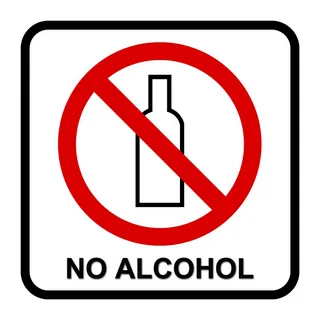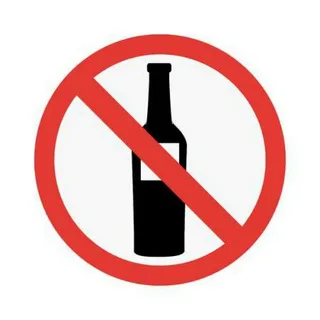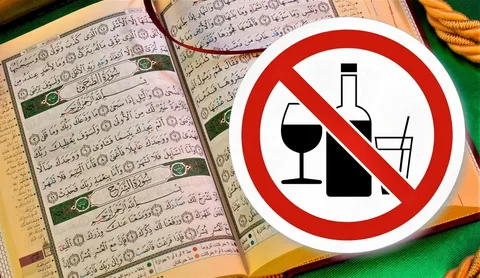Alcohol prohibition in Islam is deeply rooted in the religious and cultural fabric of the Muslim community. It goes beyond a mere restriction; it is a fundamental aspect of Islamic teachings. in This article on Arabian Tongue website we will delves into the historical, religious, and social dimensions of why alcohol is prohibited in Islam.
Historical Perspective
The roots of alcohol prohibition in Islamic societies can be traced back to early Islamic history. The initial stance on alcohol consumption set the tone for the centuries to come, shaping the Islamic worldview on intoxicants.
Recommend: haram foods
why alcohol is prohibited in Islam

In Islam, the prohibition of alcohol is based on religious teachings outlined in the Quran, the holy book of Islam, and the sayings and actions of Prophet Muhammad, known as Hadith. The primary reasons for the prohibition of alcohol in Islam are rooted in the moral, social, and spiritual well-being of individuals and the community. Here are some key reasons:
- Preservation of Mind and Judgment: Alcohol is believed to impair judgment and reasoning, leading to actions and decisions that may be harmful to oneself and others. Islam places a strong emphasis on maintaining a clear and sound mind to make responsible choices.
- Maintaining Good Morality and Behavior: Intoxication is associated with a loss of inhibitions and self-control, potentially leading to immoral behavior and actions. Islam encourages individuals to uphold high moral standards and to avoid actions that may harm their character or the well-being of society.
- Protection of Health: Islam places great importance on maintaining good health, and the consumption of alcohol is seen as harmful to the body. Excessive alcohol consumption can lead to various health issues, including liver damage, addiction, and impaired cognitive function.
- Preserving Family and Social Harmony: Alcohol abuse can contribute to family breakdowns and social issues. By prohibiting alcohol, Islam aims to protect the family structure and promote social cohesion.
- Spiritual Well-Being: Islam places a strong emphasis on spiritual growth and connection with God. Intoxication is believed to hinder spiritual development by clouding one’s consciousness and distancing individuals from their spiritual responsibilities.
- Equality and Justice: The negative social consequences of alcohol, such as crime and violence, can disproportionately affect the vulnerable and marginalized segments of society. Prohibiting alcohol is seen as a means of promoting justice and equality.
The prohibition of alcohol in Islam is part of a broader framework of ethical and moral guidelines designed to guide Muslims in leading a righteous and balanced life. It is important to note that different Islamic scholars and denominations may interpret these teachings with some variations, but the general consensus among Muslims is the avoidance of alcohol as part of their religious practice.
Read more: halal and haram food list
Quranic Guidance
The Quran, the holy book of Islam, contains clear guidance regarding the consumption of alcohol. The primary verses addressing alcohol are found in Surah Al-Baqarah (2:219) and Surah Al-Ma’idah (5:90-91). Here are the relevant verses:
- Surah Al-Baqarah (2:219):“They ask you about wine and gambling. Say, ‘In them is great sin and [yet, some] benefit for people. But their sin is greater than their benefit.'”
This verse acknowledges that there may be some perceived benefits in the consumption of alcohol, but the harm and sin associated with it outweigh any potential benefits.
- Surah Al-Ma’idah (5:90-91):“O you who have believed, indeed, intoxicants, gambling, [sacrificing on] stone alters [to other than Allah], and divining arrows are but defilement from the work of Satan, so avoid it that you may be successful. Satan only wants to cause between you animosity and hatred through intoxicants and gambling and to avert you from the remembrance of Allah and from prayer. So will you not desist?”
These verses explicitly prohibit intoxicants, which include alcohol. The prohibition is framed in the context of avoiding defilement and the influence of Satan. It emphasizes that consuming intoxicants can lead to animosity, hatred, and a diversion from the remembrance of Allah and prayer.
These verses, along with the teachings of Prophet Muhammad in the Hadith (sayings and actions), form the basis for the prohibition of alcohol in Islam. It’s important to note that interpretations and understandings of these verses may vary among scholars, but the general consensus within the Islamic tradition is that the consumption of alcohol is prohibited.
Muslims are expected to abide by the teachings of the Quran and the guidance of Prophet Muhammad, and as a result, the vast majority of practicing Muslims choose to abstain from alcohol.
Legal Implementation

The legal implementation of alcohol regulations varies widely around the world and is influenced by cultural, religious, social, and historical factors. Different countries and regions have diverse approaches to the sale, consumption, and regulation of alcoholic beverages. Here are some common legal implementations related to alcohol:
- Prohibition: Some countries, particularly those with a significant adherence to Islamic law, have outright prohibition of alcohol. For example, Saudi Arabia and Iran have strict laws against the production, sale, and consumption of alcoholic beverages.
- Age Restrictions: Many countries have laws specifying a minimum legal drinking age. This regulation aims to prevent underage drinking and restricts the sale of alcohol to individuals below a certain age. The legal drinking age varies widely, with some countries setting it at 18, while others set it at 21.
- Licensing and Regulation: Governments often regulate the production, distribution, and sale of alcoholic beverages through licensing systems. Establishments, such as bars and liquor stores, may need to obtain licenses to operate legally. This helps authorities monitor and control the sale of alcohol.
- Hours of Sale: Some jurisdictions have restrictions on the hours during which alcohol can be sold. This measure is intended to prevent issues related to late-night drinking and disturbances.
- Taxation: Governments often impose taxes on alcohol as a means of generating revenue and discouraging excessive consumption. Higher taxes on alcohol can increase prices, leading to reduced consumption.
- Advertising and Marketing Regulations: Laws may regulate the advertising and marketing of alcoholic beverages to prevent misleading promotions and to minimize the potential negative impact on public health.
- Penalties for Drunk Driving: Driving under the influence of alcohol is a serious offense in many places. Governments implement strict penalties for drunk driving, including fines, license suspension, and imprisonment, to deter individuals from driving while impaired.
- Public Consumption Laws: Some places have laws that restrict the public consumption of alcohol in certain areas or during specific events. Open container laws, for instance, may prohibit individuals from consuming alcohol in public spaces.
It’s important to note that the legal approach to alcohol varies significantly, and not all countries or regions have the same regulations. Additionally, cultural and religious influences play a significant role in shaping alcohol policies in different parts of the world. As a result, legal implementations related to alcohol should be understood within the context of the specific jurisdiction and its societal norms.
Learn Now: Quran Recitation online Course For Kids
FAQs
Is alcohol completely forbidden in Islam?
Yes, Islam prohibits the consumption of alcohol as stated in the Quran and reinforced by the teachings of Prophet Muhammad.
What are the spiritual consequences of consuming alcohol in Islam?
Consuming alcohol is believed to jeopardize one's spiritual well-being by impairing judgment and distancing the individual from God.
Are there any exceptions to the alcohol prohibition in Islam?
Generally, there are no exceptions to the prohibition. However, some scholars debate the permissibility of medicinal alcohol in specific circumstances.
How do Islamic countries enforce alcohol prohibition?
Islamic countries enforce alcohol prohibition through legal measures, including penalties and consequences for violating alcohol laws.
Modern Muslims may use alternatives to alcohol for socialization and employ coping mechanisms to navigate situations where alcohol is prevalent.
Conclusion
In summary, the prohibition of alcohol in Islam is a multifaceted concept deeply ingrained in religious, historical, and cultural contexts. Understanding the reasons behind this prohibition is essential for appreciating its significance in the lives of Muslims worldwide.


